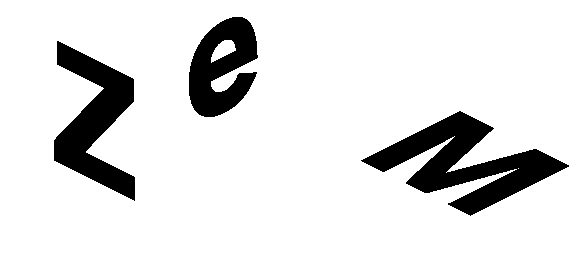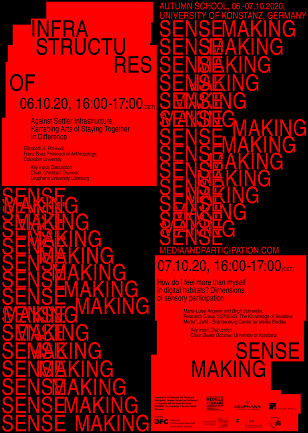
06 October 20 -
Wed
07 October 20
Location
University of Konstanz, online
Infrastructures of Sense|Making
Contemporary modes of Teilhabe (participation) in media-infused environments unfold within material and bodily infrastructures as the ground for any form of sense|making. Infrastructures, far from being mere functional connections between entities or the conveyance of information, come to define the connective tissue between social, material, and aesthetic domains in digital cultures of the 21st century. Part and parcel of such an infrastructural shift are processes of data generation and its marketability, platform-based forms of organization of information, and knowledge, but also new relations between (mobile) interfaces, discursive frameworks, and human sense modalities where the boundaries between organic and technological spheres become more and more porous. It seems to be a critical moment to scrutinize the question whether and how human sense|making is related to, and thus collides with, the intra-sensing of various agencies and the infra-sensing of techno-material processes. Immanent to these material and processual operations are thus multiple couplings of sensing and sense|making, that is, between sensors, sensation and meaning. Instead of locating such sensuous and techno-sensory regimes and attached meaning structures in predefined places of power, such as institutions, the notion of infrastructure underlines what comes to pass as sensed or registered and the occurrence of meaning depends on dynamic processes of participation.
How such emergent forms of Teilhabe occur with and through the sensuous materialities of infrastructures in order to yield meaningful effects defines the key concern of this autumn school. We conceive of participation as a process of infrastructuring with and through sensuous realms of the human and more-than-human, in order to generate different forms of sense|making. In these relational frameworks, inclusion and exclusion often are enmeshed with infrastructure operations, data generation/discrimination, and processing involving specific time economies. Drawing on research in new sensory technologies and their networked ecologies (aiming at, and being out, of control), new platforms for sensory agencies such a hearing aids, mobile media, temporalities of delay in infrastructural data curating such as online-streaming services, and the aesthetic dimensions of techno-political activism or militant art practices lie at the heart of the multi-layered conjunction between infrastructures and sense|making.
Rather than presuming a clear divide between technological infrastructure and human user, or technical interfaces and the human body, the autumn school aims at emphasizing the affective, material, and often economically driven realities of contemporary sociotechnical systems in their capacities but also constraints for various politics of participation. We wish to engage early career researchers and postdocs from a wide range of fields, such as media studies, cultural studies, sociology, science studies, cultural anthropology, HCI, philosophy of technology, aesthetics, art theory, social movements research, and performance studies to explore the infrastructural dimensions of sense|making in their material, technological, embodied, economic, computational, affective, haptic, and operational dimensions.
Program
06 October 2020
9.30
WELCOME
Marie-Luise Angerer, Research Group “SENSING: The Knowledge of Sensitive Media”, ZeM – Brandenburg Centre for Media Studies, Christoph Brunner, Leuphana University Lüneburg, Beate Ochsner, University of Konstanz, Isabell Otto, University of Konstanz, Urs Stäheli, University of Hamburg
10.00-11.00
SENSING AND EMBODIMENT
Chair: Michel Schreiber, Leuphana University Lüneburg
Getting Intimate: On Infrastructures of Desistence
Anja Breljak, Research Group “SENSING: The Knowledge of Sensitive Media”, ZeM – Brandenburg Centre for Media Studies
Of Spikes and Men – The ‘social orthopaedics’ of ‘unpleasant design’ and ‘hostile architecture’
Christoph Eggersglüß, Ruhr-Universität Bochum
11.30-12.30
CUT AND SUSPENSE
Chair: Robert Stock, University of Konstanz
The act of cutting: Multimodal inquiry on a sensing/making operation
Maxime Le Calvé, Cluster of Excellence “Matters of Activity”, Humboldt-University Berlin
Debt as total sense-cultural fact
Milan Stürmer, Leuphana University Lüneburg
14.00-15.00
(ALTERNATIVE) DATA PRACTICES
Chair: Isabell Otto, University of Konstanz
Beyond access – Alternative data infrastructures
Nate Wessalowski, Leuphana University Lüneburg
Infrastructuring computation
Irina Raskin, DFG-Research Training Group “Knowledge in the Arts”, Berlin University of the Arts
16.00-17.00
KEY INPUT DISCUSSION
Chair: Christoph Brunner, Leuphana University Lüneburg
Against settler infrastructure, Karrabing arts of staying together in difference Elizabeth Povinelli, Franz Boas Professor of Anthropology, Columbia University, Australian Academy of Humanities, Corresponding Fellow, Karrabing Film Collective
07 October 2020
10.00-11.00
INTANGIBLE ENTANGLED
Chair: Urs Stäheli, University of Hamburg
Intangible? Sensing the ‘infra’ as a question of alterity
Christian Schwinghammer, Research Group “SENSING: The Knowledge of Sensitive Media”, ZeM – Brandenburg Centre for Media Studies
Making sense in/of affective infrastructures in queer and feminist art
Magdalena Götz, Locating Media, University of Siegen
11.30-12.30
AUTOMATED/AUTONOMOUS DECISION MAKING
Chair: Matthias Denecke, University of Hamburg
Sensor-based navigation: Infrastructural interoperability as methodological opportunity Sam Hind, CRC Media of Cooperation, University of Siegen
Apps as new infrastructures for health? A socio-technical study of the food coach app in the making
Michele Meister, Universität St. Gallen
14.00-15.00
MATERIALITY AND AESTHETICS
Chair: Jan Distelmeyer, Research Group “SENSING: The Knowledge of Sensitive Media”, ZeM – Brandenburg Centre for Media Studies
Atmospheric infrastructures of care and concern
Desiree Förster, University of Chicago
The potent afterlife of media – Infrastructures of sense|making and the ruins of anthropotechnical interfaces in digital audio workstations and streaming platforms
Matthias Drusell, University of Hamburg
16.00-17.00
KEY INPUT DISCUSSION
Chair: Beate Ochsner, University of Konstanz
How do I feel more than myself in digital habitats?
Dimensions of sensory participation
Marie-Luise Angerer and Birgit Schneider, Research Group “SENSING: The Knowledge of Sensitive Media”, ZeM – Brandenburg Centre for Media Studies
17.00-17.30
WRAP UP AND FINAL REFLEXION
* All times are Central European Time.
Registration
Participation is free. Please register by writing an email to by 02 October 2020.
Registered participants will get a link for joining the online workshop.
Reading List
Povinelli, Elizabeth A. (2016): Geontologies. A Requiem to Late Liberalism. Durham: Duke University Press, Chapter 6 Downloading the Dreaming.
Christen, Kim; Cooney, Chris: Digital Dynamics Across Cultures. Vectors Journal.
Povinelli, Elizabeth A.; Cho, Peter: Digital Futures – Editor’s Introduction. Vectors Journal.
Organizing Team
Marie-Luise Angerer (Potsdam), Christoph Brunner (Lüneburg), Mathias Denecke (Hamburg), Anne Ganzert (Konstanz), Beate Ochsner (Konstanz), Isabell Otto (Konstanz), Christian Schwinghammer (Potsdam), Robert Stock (Konstanz)
Design
Poster, Video and Flyer: Marius Förster, operative.space






